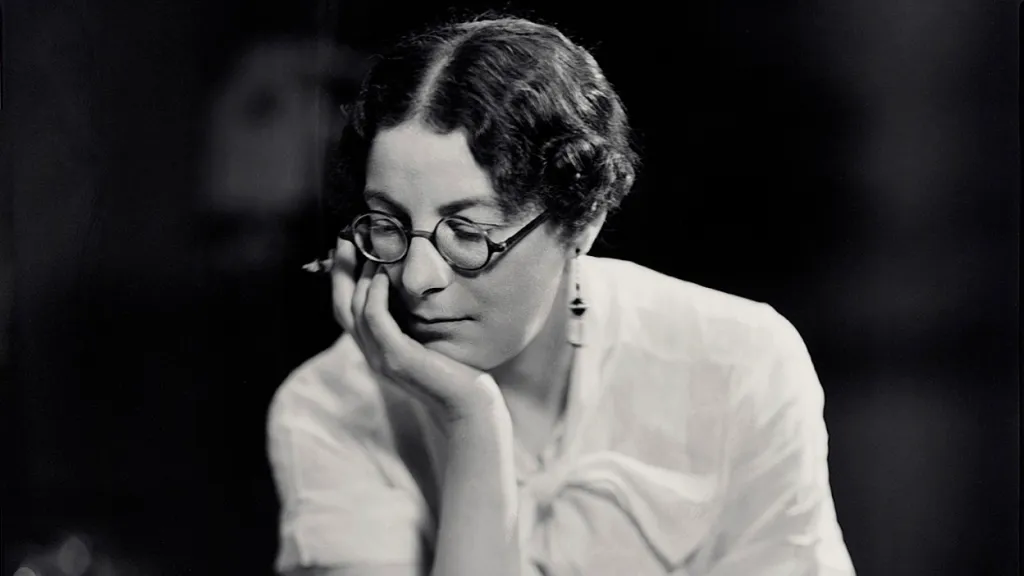Sylvia Townsend Warner is the revelation of the year for me. Might sound silly to say this, since 2024 has just begun. But just bear with me here. I think she’s an underrated writer of what we might call literary fantasy. Nothing in the style of Lord of the Rings though. I raved about her first novel Lolly Willowes, and about a posthumous collection of short stories, and in this post, I would like to focus more on what makes her writing such a special flavour of fantasy. I am by no means an expert and far from having read everything she published during her life. But I am very excited about discovering more. So, this is me basically yelling at you to go out there and get your hands on a Sylvia Townsend Warner novel or collection of short stories. I’ll summarize my discoveries so far and make my case why she’s totally worth your time. Let’s get into it!
some biographical details of sylvia townsend warner
The Literary Ladies’ guide does this better than me, but just a short overview. Born into a well-off English family in 1893, Sylvia Townsend Warner was raised in an intellectually stimulating environment. Her father, a history professor, taught her history, while her mother, in response to Sylvia’s school expulsion for mimicking teachers, took up the role of teaching her to read. The family faced a significant blow when Sylvia’s father passed away when she was 22, prompting her to make the decision to move out and rent her own flat.
Music was one of Sylvia’s passions and her knowledge led her to become one of the editors of the monumental Tudor Church Music, an encyclopedia of 16th-century religious music. Sylvia was well known in the literary circles of London, and, during such a meeting, she crossed paths with the poet Valentine Ackland, the love of her life. The two women were convinced communists and official party members, until Valentine realized that Stalin’s politics is nothing better than Hitler’s fascism. They lived together in Norfolk until the end of Valentine’s life. Sylvia died in the winter of 1978, one year after having published her fantastic Kingdoms of Elfin.
Townsend Warner published 7 novels, 15 collections of short stories, a biography of T.H. White, poetry and letters. In her writing she approached a whole range of literary styles, while keeping her characteristic irony and sometimes chilling narrative voice. Lolly Willowes is her first novel, published in 1926 and is what we might call a fantasy, if we are to generalize. Another 6 novels followed, among which Summer Will Show in 1936. I’m particularly interested in The Corner That Held Them, a 1948 historical fiction (apparently) about a 14th century convent and Mr Fortune’s Maggot, published in 1927, which deals with the attempts of a European missionary to convert remote populations to Christianity. Both these novels remind me of modern works of fiction, and I would like to see if there are any parallels to be drawn.
lolly willowes (1926)
Lolly Willowes, Sylvia Townsend Warner first novel, published in 1926, tricked me at first. Reading the book for the first time, you’d think it’s a nice little story about an unmarried woman who, after living with her brother’s family, decides to seek out her freedom in the English countryside. Far from it. Since I already got into the intricacies of the book in a previous post, I’m not gonna revisit its plot again. But I will say that we are dealing with witchcraft and Satan here. The novel is set against the backdrop of post-WWI England and is its own blend of feminism, social commentary and, well, fantasy. I think that what makes the novel transcend genre boundaries is that it is not about witchcraft, nor about Satan. These are just helpful props which lead Lolly to stray from the well-beaten path off into the woods of self-acceptance and independence. Unlike conventional fantasy, where the fantastic elements are supposed to be “real”, Townsend Warner’s fantasy in Lolly Willowes works more like a metaphor for freedom and for the power of women to choose their own paths in life.
kingdoms of elfin (1977)
If the fantasy of Lolly Willowes is more metaphor than “real” fantasy, this is not the case for the short stories collected under the name Kingdoms of Elfin in 1977. Townsend Warner was already in her 80s when she decided to take a completely new turn in her writing. ‘Something Entirely Different’ was printed in The New Yorker in 1972 and marked the beginning of a series of short stories about the life of fairies. Fairy tales in the most literal sense of the word. The first story is about a boy, Tiffany, who is kidnapped by the fairies and taken to live in Elfhame, one of the many elfin kingdoms in the world. The series continued for the next 3 years, and the last story was published in 1975.
The special thing about the Elfin stories is the point of view of the narrator. The stories are purely fantastical, but the cold, minimalistic and matter-of-fact way they are told makes you believe you read a historical account. Over the course of the sixteen stories, we learn about the many kingdoms of the Elfin, their cultural particularities, what they eat, how they live, about their royalty and their commoners. I haven’t read all the stories of the collection, but one story which impressed me was ‘The Five Black Swans’, published in 1973. The Elfin have very long lives and it’s not very clear how they die, but when five black swans circle the skies over the castle of Elfhame, Queen Tiphaine’s court assumes her death is near. In the muteness of death, the Queen remembers a romance with a human, while her servants hope she will name her successor. If she doesn’t, they will have to rely on an old custom – watch larks desperately struggle to survive while being pulled underwater by weights tied to their feet. Even more cruel and chilling scenes are described in the stories and their fantastic pull almost made me forget that fantasy is never about fairies, nymphs or Satan. It’s always about people.
“stay, corydon, thou swain” (1929)
This was one of my favourite stories in The Music at Long Verney, a posthumous collection of Townsend Warner’s short stories. The title really stands out, doesn’t it? It’s the title of a madrigal composed by John Wilbye in 1609 and a reference to her knowledge and love of music. Mr Mulready of the story has sung in the church choir for many years and this piece was nothing new for him. But singing it this time, a verse jumps out at him: “The nymph is light and shadowlike”. It doesn’t let go of him for the rest of the evening. He remembers the nymphs of his childhood when, he says, “perhaps he had been taken to see a nymph as a treat”. Mr Mulready gets completely obsessed with finding a nymph in his real life and, when he discovers that his employee in the shop, Miss Edna Cave, is a nymph, his wish is fulfilled. At the beginning we don’t take him seriously, we think it’s just an old man’s fantasy. But when a day out in the woods comes to a chilling and abrupt end, we have no doubt – Edna Cave is a nymph.
Abrupt, unexplained endings are a specialty of Townsend Warner and they really drive me crazy. But in a good way. I am delighted with how she’s manipulating my reader’s expectations, how she plays with irony to lead me down a wrong path, just to pull me back up at the end. Mr Mulready has known nymphs since his childhood. That much is clearly said. If we laugh at him, it’s the fault of our own predispositions, assumptions and expectations. The fantasy in “Stay, Corydon, Thou Swain” puts up a mirror to that and reminds us that the fantastic and miraculous is hidden in our world of stone and concrete.
the children’s grandmother (1950)
A podcast episode from The New Yorker pointed the direction to this story. Irish writer Colm Toibin reads the story out loud and discusses its meaning and undertones. The story itself is not fantasy, or not as fantasy as the other pieces I commented on here, but it does have some layers which I sometimes stumble upon even in my daily life. The story is told in first person by a woman whose husband has died and who is now living with his mother, her children’s grandmother. There’s not much happening, really, but we get a perfect sense of how feelings and unspoken years of unhappiness bubble up to the surface with time. The fantasy comes more in the form of superstition and gothic. It lies in the way the young woman perceives the powerful and intimidating presence of the grandmother, the grandmother’s pain of having lost almost all her children to sickness and the way both women come to terms with what they went through. The fact that the story is set on the Cornish moors, close to the sea, increases that feeling of foreboding and makes you expect that a ghost might just show up at any moment. In the end, I tried to convince myself it’s just in my head.
final thoughts on sylvia townsend warner
Penguin, Faber and Handheld Press republished Sylvia Townsend Warner’s works over the last years in their visually attractive and instantly recognizable paperback format. I mean, I found Lolly Willowes at Heathrow while I was just waiting for my flight. I think she is slowly coming back to the foreground of our modern day culture, but this can only happen if we, readers, wish for it. In this post I made my case why she’s absolutely worth our time. I think that the special flavour of fantasy in some of her short stories, in Lolly Willowes and in the collection Kingdoms of Elfin appeals to a modern reading audience and also reminds us of our place in time. In cheering on Sylvia Townsend Warner’s literary revival, we are embracing her dark, and also captivating, fantasy worlds, while also recognizing that good stories are landmarks in our development as human beings.





your thoughts?